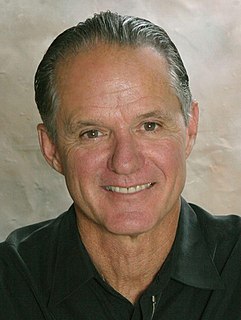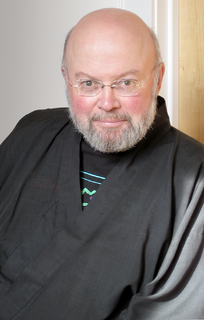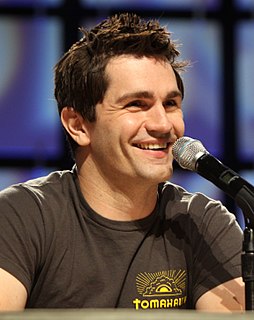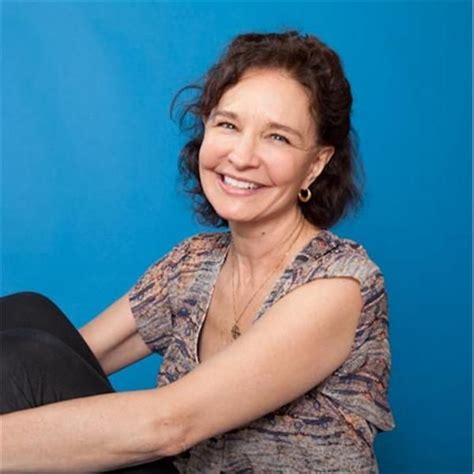A Quote by Richard Strozzi-Heckler
The greatest cost of the specialization of technological life - and out of which all other damages are birthed - is arguably our separation from the practical and enriching sense of ourselves as embodied beings. When we are alienated from the wisdom of the body, our lives become theoretical and abstract, and we are distanced from the direct, felt sense of living.
Related Quotes
[When we drop our agendas] we begin to cultivate a mind of true goodness and compassion, which comes out of a concern for the Whole. As we live out of such a mind, we become generous, with no sense of giving or of making a sacrifice. We become open, with no sense of tolerance. We become patient, with no sense of putting up with anything. We become compassionate, with no sense of separation. And we become wise, with no sense of having to straighten anyone out.
When something goes wrong in our lives we often ask ourselves "Who was present?" and if there was ever a singular person that was present in whatever the event was when something changed our lives. If we can't get beyond that event, we become obsessed with it or it changed our life in a way that we can't make sense of. We often seek out that person because that was the last time our lives made sense.
The artist appeals to that part of our being which is not dependent on wisdom; to that in us which is a gift and not an acquisition-and therefore, more permanently enduring. He speaks to our capacity for delight and wonder, to the sense of mystery surrounding our lives; to our sense of pity, and beauty and pain.
The biggest adversary in our life is ourselves. We are what we are, in a sense, because of the dominating thoughts we allow to gather in our head. All concepts of self-improvement, all actions and paths we take, relate solely to our abstract image of ourselves. Life is limited only by how we really see ourselves and feel about our being. A great deal of pure self-knowledge and inner understanding allows us to lay an all-important foundation for the structure of our life from which we can perceive and take the right avenues.
And how we become like our parents! How their scorned advice - based, we felt in our superiority, on prejudices and muddled folk wisdom - how their opinions are subsequently borne out by our own discoveries and sense of the world, one after one. And as this happens, we realise with increasing horror that proposition which we would never have entertained before: our mothers were right!
[The artist] speaks to our capacity for delight and wonder, to the sense of mystery surrounding our lives; to our sense of pity, and beauty, and pain; to the latent feeling of fellowship with all creation--and to the subtle but invincible conviction of solidarity in dreams, in joy, in sorrow, in aspirations, in illusions, in hope, in fear?which binds together all humanity--the dead to the living and the living to the unborn.
The quality of light by which we scrutinize our lives has direct bearing upon the product which we live, and upon the changes which we hope to bring about through those lives. It is within this light that we form those ideas by which we pursue our magic and make it realized. This is poetry as illumination, for it is through poetry that we give name to those ideas which are, until the poem, nameless and formless-about to be birthed, but already felt.
To be intuitive, we must cultivate our sense of humor and look for reasons to laugh everywhere. We become so self-absorbed and serious when it comes to our problems and melodramas that we disconnect from our deeper sense of who we are as beautiful souls-we withdraw from life instead of enjoying it. Laughter brings us back to ourselves and back to life.
Peace is not just the absence of war, it is the active presence of a capacity for love and compassion, and reciprocity. It is an awareness that our lives are not to be lived simply for ourselves through expressing our individuality, but we confirm the purpose of our lives through the work of expressing our shared sense of community in a purposeful and practical way; to sustain our own lives we sustain the lives of others - in family, in a community of neighborhoods called a city, and in a community of nations called the world.
Human beings are very unbalanced and prone to go off on tangents. In every area of life- with too great emphasis on one thing, leaving out another important thing altogether. None of us will ever be perfectly balanced in our spiritual lives, our intellectual lives, our emotional lives, our family lives, in relationships with other human beings, or in our business lives. BUT WE ARE CHALLENGED TO TRY, WITH THE HELP OF GOD. We are meant to live in the scriptures.
There are moments in our lives, there are moments in a day, when we seem to see beyond the usual- become clairvoyant. We reach then into reality. Such are the moments of our greatest happiness. Such are the moments of our greatest wisdom. It is in the nature of all people to have these experiences; but in our time and under the conditions of our lives, it is only a rare few who are able to continue in the experience and find expression for it.
Realizing that our minds control our bodies while our bodies reflect our minds amounts to understanding the most fundamental aspects of ourselves. It further equals a comprehension of the relationship between our "tools." And since the mind and body are interrelated, this understanding makes it easier to see why coordinating them is a practical way of using these tools to greatest effect-a way of using the mind and body to live our lives as art.

































